Related Research Articles
Judicial Watch (JW) is a 501(c)(3) nonprofit American conservative activist group that files Freedom of Information Act (FOIA) lawsuits to investigate claimed misconduct by government officials. Founded in 1994, Judicial Watch has primarily targeted Democrats, in particular the administrations of Bill Clinton and Barack Obama, as well as Hillary Clinton's role in them. It was founded by attorney Larry Klayman, and has been led by Tom Fitton since 2003.
Crime in Washington, D.C., is directly related to the city's demographics, geography, and unique criminal justice system. The District's population reached a peak of 802,178 in 1950. Shortly after that, the city began losing residents, and by 1980 Washington had lost one-quarter of its population. The population loss to the suburbs also created a new demographic pattern, which divided affluent neighborhoods west of Rock Creek Park from the less well-off neighborhoods to the east.

On January 20, 2005, a number of counter-inaugural demonstrations were held in Washington, D.C., and other American cities to protest the second inauguration of President George W. Bush.
Larry Elliot Klayman is an American attorney, right-wing activist, and former U.S. Justice Department prosecutor. He founded both Judicial Watch and Freedom Watch.
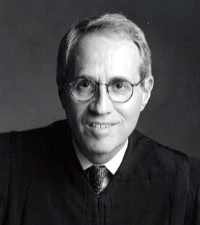
Paul Lawrence Friedman is a senior United States district judge of the United States District Court for the District of Columbia. He serves as secretary of the American Law Institute.

Emmet Gael Sullivan is an American attorney and jurist serving as a senior United States district judge of the United States District Court for the District of Columbia.
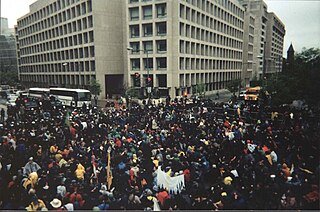
Washington A16, 2000 was a series of protests in Washington, D.C. against the International Monetary Fund and the World Bank, that occurred in April 2000. The annual IMF and World Bank meetings were the scene for follow-on protests of the 1999 WTO protests. In April 2000, between 10,000 and 15,000 protesters demonstrated at the IMF, and World Bank meeting.

Metropolitan African Methodist Episcopal Church is a historic church located at 1518 M Street, N.W., in downtown Washington, D.C. It affiliates with the African Methodist Episcopal Church.
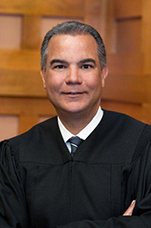
Christopher Reid "Casey" Cooper is an American lawyer who serves as a United States district judge of the United States District Court for the District of Columbia.

DisruptJ20 was an organization that protested and attempted to disrupt events of the presidential inauguration of the 45th U.S. President, Donald Trump, which occurred on January 20, 2017. The group was founded in July 2016 and publicly launched on November 11 after Trump won the 2016 United States presidential election. DisruptJ20's inauguration protests were a part of a wider array of protests organized both locally and nationally from a more extensive initial plan. The protests included efforts to blockade one bridge and to shut down security checkpoints. James O'Keefe and Project Veritas had some success infiltrating DisruptJ20's planned inauguration efforts.

Trevor Neil McFadden is an American lawyer who serves as a United States district judge of the United States District Court for the District of Columbia. Previously, he was a deputy assistant attorney general in the Criminal Division of the Department of Justice.
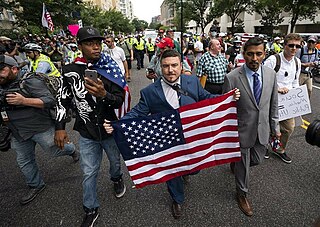
The "Unite the Right 2" rally was a white supremacist rally that occurred on August 12, 2018, at Lafayette Square near the White House in Washington, D.C., United States. It was organized by Jason Kessler to mark the first anniversary of the 2017 Unite the Right rally in Charlottesville, Virginia, which ended in deadly violence and attracted both national and international attention.
On November 17, 2017, Bijan C. Ghaisar, a 25-year-old American, was fatally shot by US Park Police officers Lucas Vinyard and Alejandro Amaya after a vehicular chase that followed a traffic collision along the George Washington Memorial Parkway in Northern Virginia. Ghaisar was unarmed and died ten days later in a hospital. A video of the shooting was released by Fairfax County Police, who had assisted with the chase.

In June 2020, the Trump administration began deploying federal law enforcement forces to select cities in the United States in response to rioting and monument removals amid the George Floyd protests. Federal law enforcement elements were deployed under Operation Legend, Operation Diligent Valor, and the Protecting American Communities Task Force (PACT). The Department of Homeland Security (DHS) cited an executive order regarding "monuments, memorials and statues" as allowing federal officers to be deployed without the permission of individual U.S. states, as the federal government "has the right to enforce federal laws, investigate crimes and make arrests" within states.

Protests began in multiple cities in the United States following the 2020 United States presidential election between then-President Donald Trump and Democratic Party challenger Vice President Joe Biden, held on November 3, 2020. Biden won the election, receiving 81.3 million votes (51.3%) to Trump's 74.2 million (46.9%) and winning the Electoral College by 306 to 232. Biden's victory became clear on November 7, after the ballots had been tabulated. The Electoral College voted on December 14, in accordance with law, formalizing Biden's victory.
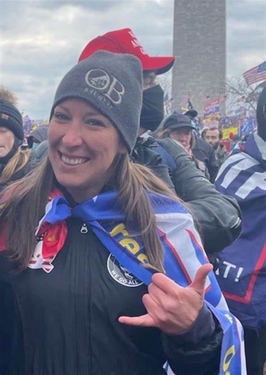
On January 6, 2021, Ashli Babbitt was fatally shot during the attack on the United States Capitol. She was part of a crowd of supporters of then U.S. president Donald Trump who breached the United States Capitol building seeking to overturn his defeat in the 2020 presidential election.
The January 6 United States Capitol attack was followed by political, legal, and social repercussions. The second impeachment of Donald Trump, who was charged for incitement of insurrection for his conduct, occurred on January 13. At the same time, Cabinet officials were pressured to invoke the 25th Amendment for removing Trump from office. Trump was subsequently acquitted in the Senate trial, which was held in February after Trump had already left office. The result was a 57–43 vote in favor of conviction, with every Democrat and seven Republicans voting to convict, but two-thirds of the Senate are required to convict. Many in the Trump administration resigned. Several large companies announced they were halting all political donations, and others have suspended funding the lawmakers who had objected to certifying Electoral College results. A bill was introduced to form an independent commission, similar to the 9/11 Commission, to investigate the events surrounding the attack; it passed the House but was blocked by Republicans in the Senate. The House then approved a House "select committee" to investigate the attack. In June, the Senate released the results of its own investigation of the attack. The event led to strong criticism of law enforcement agencies. Leading figures within the United States Capitol Police resigned. A large-scale criminal investigation was undertaken, with the Federal Bureau of Investigation (FBI) opening more than 1,200 case files. Federal law enforcement undertook a nationwide manhunt for the perpetrators, with arrests and indictments following within days. Over 890 people had been found guilty of federal crimes.

Supporters of Donald Trump, the 45th president of the United States, held small-scale armed protests and demonstrations at U.S. state capitols in the five days leading up to the inauguration of Joe Biden on January 20, 2021, in opposition to the results of the 2020 United States presidential election, which continued after the failure of the violent January 6 attempt to overturn the election in Trump's favor. Pro-Trump groups failed to stage organized dissent or affect the transition of power in an environment of deterrence and heightened security.
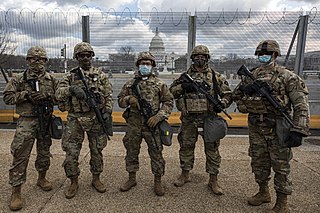
The storming of the United States Capitol on January 6, 2021, raised concerns about the security of the inauguration of Joe Biden two weeks later on January 20, 2021. The inauguration, like all ceremonies since the first inauguration of George W. Bush in 2001, was designated a National Special Security Event (NSSE); however, on this occasion, the week preceding it was included in preparations. Biden chose not to move the ceremony indoors, indicating that he believed a public, outdoor ceremony was necessary to demonstrate strength. Former Homeland Security Advisor Lisa Monaco advised the Biden team on security-related matters for the ceremony.

On January 6, 2021, supporters of then-President Donald Trump attacked the U.S. Capitol Building, disrupting the joint session of Congress assembled to count electoral votes to formalize Joe Biden's victory in the 2020 United States Presidential Election. By the end of the month, the Federal Bureau of Investigation (FBI) had opened more than 400 case files and issued more than 500 subpoenas and search warrants related to the riot. The FBI also created a website to solicit tips from the public specifically related to the riot and were especially assisted by the crowdsourced sleuthing group Sedition Hunters. By the end of 2021, 725 people had been charged with federal crimes. That number rose to 1,000 by the second anniversary of the attack, and to 1,200 by the third anniversary, at which point over 890 people had been found guilty of federal crimes. These federal cases are handled by the U.S. Attorney's Office for the District of Columbia (D.C.). State cases, of which there are fewer, are handled in the D.C. Superior Court.
References
- 1 2 Rob Hotakainen, Provocative hats and pot: Protesters fight for space and permits in inaugural splash, McClatchy DC (January 5, 2017).
- 1 2 Perry Stein, Activists slam Park Service, Trump camp for handling of land for inauguration, Washington Post (January 5, 2017).
- 1 2 3 4 5 David Montgomery, Stirring a Cause, Washington Post (May 12, 2003).
- ↑ Theola Labbé-DeBose, D.C. husband-wife legal team fights for protesters' rights, Washington Post (March 23, 2010), B01.
- ↑ Carol D. Leonnig, Police Agree to Protester Reforms, Washington Post (November 22, 2006).
- ↑ Jonathan O'Connell, Advocates go to court in fight to protect protest space outside Trump hotel, Washington Post (August 3, 2016).
- 1 2 Harry Jaffe, The Capital's Top Cop: The most popular official in Washington, D.C., isn't an elected leader, Politico (July 16, 2015).
- ↑ Del Quentin Wilber, Class Action Filed Over Checkpoints, Washington Post (June 21, 2008).
- ↑ Del Quentin Wilber, Partnership for Civil Justice Appeals D.C. Checkpoint Ruling, Washington Post (May 9, 2009).
- ↑ Mills v. District of Columbia , 571 F.3d 1304 (D.C. Cir. 2009), reversing 584 F. Supp. 2d 47 (D.D.C. 2008).
- ↑ ""Truly Historic Settlement" Approved in Pershing Park Class Action". Partnership for Civil Justice Fund. September 21, 2010.
- ↑ "April 2000 IMF Mass False Arrests". Partnership for Civil Justice Fund. 2012. Retrieved 2016-12-10.
- ↑ Maria Glod, D.C. agrees to $13.7 million settlement in 2000 mass arrest, Washington Post (July 1, 2010).
- ↑ Michael S. Schmidt & Colin Moynihan, F.B.I. Counterterrorism Agents Monitored Occupy Movement, Records Show, New York Times (December 24, 2012).
- ↑ Government Surveillance of the Occupy Protests, New York Times (May 22, 2014).
- ↑ Carol Hand, Understanding Your Right to Assemble (Rosen, 2014), pp. 88-89.
- 1 2 Ann E. Marimow, Judge finds District's rules for hanging political posters unconstitutional, Washington Post (November 29, 2012).
- ↑ Act Now to Stop the War and End Racism Coalition v. District of Columbia , 798 F. Supp. 2d 134 (D.D.C. 2011).
- ↑ Colin Moynihan, Judge Allows Protesters’ Suit Against Police to Proceed, New York Times (June 8, 2012).
- ↑ Matt Sledge, Court Dismisses Occupy Wall Street's Brooklyn Bridge Lawsuit, Huffington Post (February 24, 2015).
- ↑ Garcia v. Doe , 779 F.3d 84 (2d Cir. 2014), amended following rehearing (2015).
- ↑ Image by Jim Lo Scalzo of the European Pressphoto Agency, published in Charlie Savage, Judge Questions Legality of N.S.A. Phone Records, New York Times (December 16, 2013).
- ↑ 'Thank You, Ed Snowden' campaign, Partnership for Civil Justice Fund (last accessed February 4, 2017).
- ↑ Tal Kopan, Edward Snowden pic coming to D.C. buses, Politico (November 20, 2013).
- ↑ Sarah Anne Hughes, More Snowden Bus Ads Coming To D.C. Archived 2014-01-05 at the Wayback Machine , DCist (January 2, 2014).
- ↑ Michael Shank & Allyson Mitchell, DC Public Schools: How to keep kids out of class, not in, Washington Post (April 29, 2013).
- ↑ Ann E. Marimow, When the inaugural parade passes the Trump hotel, will protesters be there, too?, Washington Post (November 14, 2016).
- ↑ Todd Ruger, Protest Group Fights for Access to Key Inauguration Spots, Roll Call (November 14, 2017).
- ↑ Ann E. Marimow, Appeals court upholds Park Service rules on location of inaugural parade protests, Washington Post (January 17, 2017).
- ↑ Keith L. Alexander, D.C. law groups offer free legal help to demonstrators arrested this weekend, Washington Post (January 19, 2017).
- ↑ Mark Segraves, DC Police Sued Over Inauguration Day Arrest Records, WRC-TV (March 24, 2017).